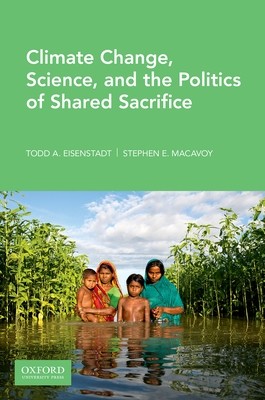
- We will send in 10–14 business days.
- Author: Todd A Eisenstadt
- Publisher: Oxford University Press, USA
- ISBN-10: 0190063696
- ISBN-13: 9780190063696
- Format: 15.5 x 23.1 x 1 cm, softcover
- Language: English
- SAVE -10% with code: EXTRA
Climate Change, Science, and the Politics of Shared Sacrifice (e-book) (used book) | bookbook.eu
Reviews
Description
Designed for undergraduate courses that cover climate change politics within environmental studies, politics, and international relations courses, Climate Change, Science, and The Politics of Shared Sacrifice integrates science and policy within each chapter by considering technical issues as well as their political implications. It reflects the recent changes in US climate policy under President Biden, as well as by other international actors, and covers recent technological advances, including carbon capture, storage and solar energy efficiency. This text presents the questions students need to address in an interdisciplinary approach to perhaps the most encompassing and "wicked" threat to our well-being in the 21st Century. It addresses the impacts of climate change, the history of international negotiations leading to the Paris Agreement and its possible "ambition gap," approaches to decarbonization by nations and economic sectors, and efforts to construct post-fossil fuel
energy systems. It also considers implications of recent technological advancements in energy and its distribution, the debate about the "social cost of carbon," the economic costs of adapting to climate change, and the proper roles of individuals versus governments, corporations, and environmental groups.
change. The second part of the book discusses that while there is no single magical solution, there are many partial solutions which could contain global climate change within prescribed limits. We also discuss forms of solving the political, social, and economic problems stemming from climate change, but note that different solutions produce different "winners" and "losers." Changes to how we produce and consume energy will be driven by market forces, thoughtful policy, and by steady efforts to inform the public. The instructor resources site includes access to chapter graphics, class PowerPoints, and case study sample solutions.
EXTRA 10 % discount with code: EXTRA
The promotion ends in 19d.18:04:28
The discount code is valid when purchasing from 10 €. Discounts do not stack.
- Author: Todd A Eisenstadt
- Publisher: Oxford University Press, USA
- ISBN-10: 0190063696
- ISBN-13: 9780190063696
- Format: 15.5 x 23.1 x 1 cm, softcover
- Language: English English
Designed for undergraduate courses that cover climate change politics within environmental studies, politics, and international relations courses, Climate Change, Science, and The Politics of Shared Sacrifice integrates science and policy within each chapter by considering technical issues as well as their political implications. It reflects the recent changes in US climate policy under President Biden, as well as by other international actors, and covers recent technological advances, including carbon capture, storage and solar energy efficiency. This text presents the questions students need to address in an interdisciplinary approach to perhaps the most encompassing and "wicked" threat to our well-being in the 21st Century. It addresses the impacts of climate change, the history of international negotiations leading to the Paris Agreement and its possible "ambition gap," approaches to decarbonization by nations and economic sectors, and efforts to construct post-fossil fuel
energy systems. It also considers implications of recent technological advancements in energy and its distribution, the debate about the "social cost of carbon," the economic costs of adapting to climate change, and the proper roles of individuals versus governments, corporations, and environmental groups.
change. The second part of the book discusses that while there is no single magical solution, there are many partial solutions which could contain global climate change within prescribed limits. We also discuss forms of solving the political, social, and economic problems stemming from climate change, but note that different solutions produce different "winners" and "losers." Changes to how we produce and consume energy will be driven by market forces, thoughtful policy, and by steady efforts to inform the public. The instructor resources site includes access to chapter graphics, class PowerPoints, and case study sample solutions.


Reviews